How I Wash My Hair with Bicarb and Vinegar
Most people are a more than a little intrigued when I tell them I wash my hair with bicarb and vinegar. (The ones that aren’t? They either say, me too. Or they raise their eyebrows in slight alarm!)
Then of course, everyone wants to know the specifics. How does it work? How is it applied? How often do I need to wash my hair? All great questions. If this has been puzzling you, today I’m going to share some answers.
If you’re really not up for trying it yourself, I’ve also shared a post on alternative plastic-free hair shampooing options. But before you head over there, why not read this anyway – you might be pleasantly surprised!
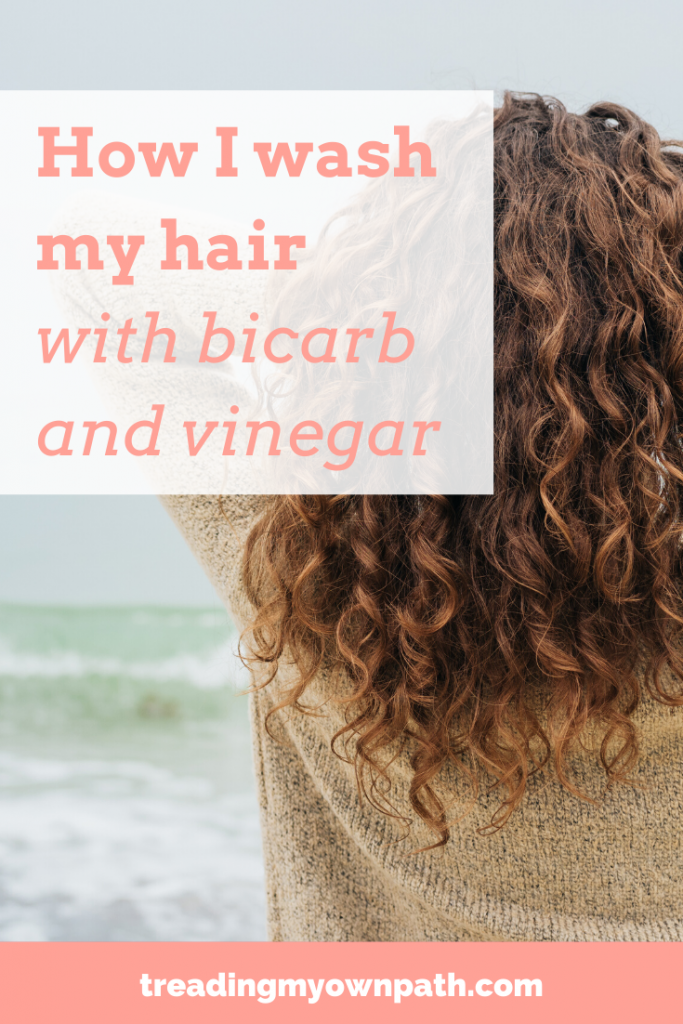
Washing My Hair With Bicarb and Vinegar
I’ve been washing my hair with bicarb (sodium bicarbonate, also called bicarbonate of soda or bicarb soda) and vinegar since 1st June 2014. I wrote a blog post about it at the time, along with my reasons why (aside from avoiding the plastic bottles). Three years later, I’m still using it, although I often use rye flour as an alternative to bicarb (I’ll talk about this later).
Here’s a picture from the first washes back in 2014…
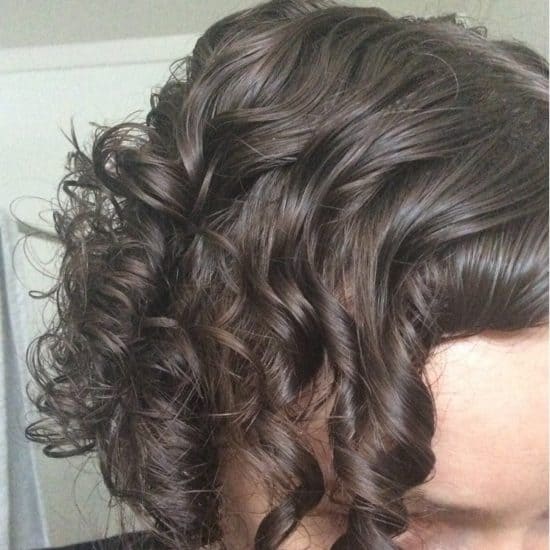
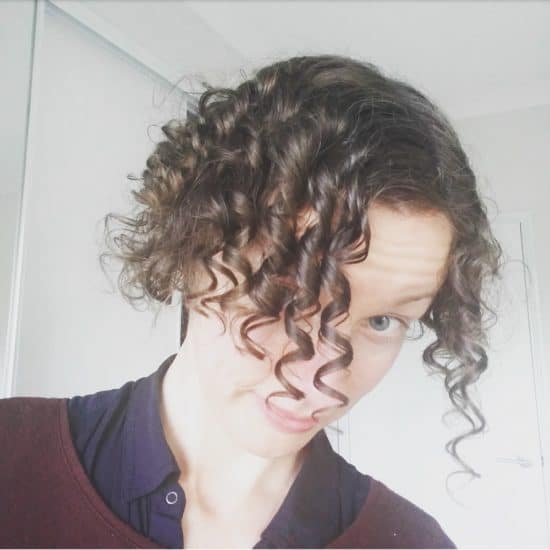
…and here’s one from this week.
I’m definitely a convert.
So how does it work?
How much of each (bicarb and vinegar) do you use?
I have slightly-shorter-than-shoulder-length hair, and I use between a teaspoon and a dessert spoon of bicarb per wash. This is my shampoo replacement. I use 1/8th cup of white vinegar, diluted to a cup with warm water, as my conditioner replacement.
How do you apply bicarb and vinegar to your hair?
I mix the bicarb with a small amount of water to make a watery slurry (bicarb is water soluble). I apply to my hair, rub in (you wont be able to feel it like you can regular shampoo) and then rinse off with warm water.
I pour the vinegar/water mix over my head slowly, rub in, and then rinse off as I would regular conditioner.
I towel dry my hair as normal.
What containers do you use to store them?
I don’t keep them in the shower. I keep a jar of bicarb under the sink, and a bottle of white vinegar under the sink too. After trying various bowls and cups, I now use my stainless steel measuring cups in the shower. I was never particularly worried about breakages, but it could happen. I also find it easier to pour from the measuring cups than a regular cup or bowl.
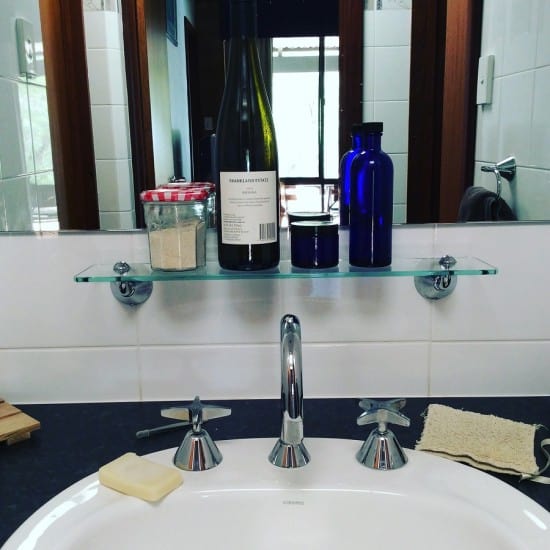
A friend of mine tried bicarb and vinegar hair-washing, and kept the diluted vinegar ready in a bottle in the shower. I don’t do this because I learned the hard way that vinegar + hot water is a much more pleasant experience than vinegar + cold water. I would only do this if I lived somewhere so hot I wanted a cold shower.
Aren’t you meant to use apple cider vinegar?
I use regular white vinegar. I know that apple cider vinegar is commonly cited as the vinegar to use, and I’ve tried it, but I prefer white vinegar. I find apple cider vinegar leaves my hair duller. Apple cider vinegar is slightly less acidic than white vinegar, but I’m diluting 1:8 times with water, and rinsing off after a minute or less.
Don’t you smell of vinegar?
Actually, no. If you’re worried about smell, white vinegar dissipates almost instantly upon rinsing. Apple cider vinegar will take a little longer. The first time I ever tried this I was paranoid that I smelled like fish and chips, but I think it was just that my hair is much closer to my nose than anyone else’s.
If you’re really worried about smell, or miss the fragrance of traditional shampoo, you can add a 1-2 drops essential oil to the vinegar before applying.
How often do you wash your hair?
I wash my hair every 3-5 days. Not so much because my hair gets greasy, but because the curls start to look straggly. If it’s only been 3 days, I might omit the bicarb step and just do the vinegar rinse.
Will my hair fall out?
There was an article going around the internet, stating that using bicarb and vinegar to wash your hair will make it fall out. I’ve written my thoughts on that here. There’s no reason why using bicarb or vinegar to wash hair would cause hair loss.
After 3+ years, I still have a full head of hair.
You mentioned rye flour. How does that work?
Instead of using bicarb, I’ve also used rye flour to wash my hair. Bicarb is a salt, and is mined from the ground. Rye flour is ground from rye, a plant. Sustainable speaking, rye is probably the more eco-friendly option. It also leaves my hair much shinier than bicarb. Plus, as it’s not water soluble, it mixes with water to form a paste which is much easier to apply to your hair.
On the down side, if you aren’t careful you can end up with huge flakes of rye flour that look like brown dandruff. Believe me, discovering chunks of flour falling out of your hair as you ruffle it is quite alarming.
To reduce this, you can sieve the flour before you use it (a tea strainer will likely have the finest mesh). Also, post washing, be sure to towel dry your hair really well. And never ever apply to dry hair, or you will end up with a flour crust on your scalp!
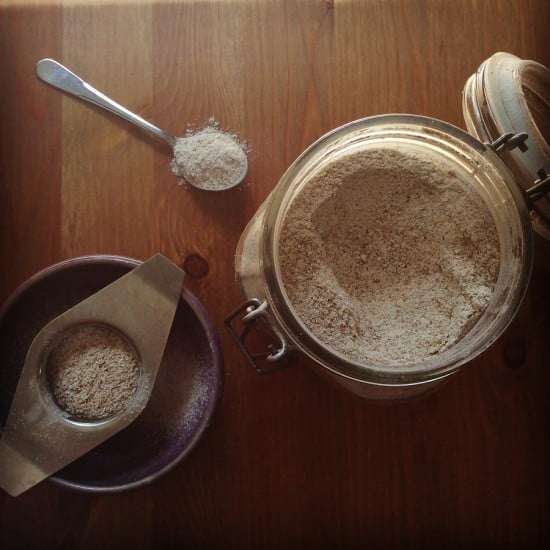
Anything else?
If you’re switching from regular shampoo, your hair will take some time to adjust. Regular shampoo tends to strip oil from the scalp, so the skin compensates by making more oil. Some people find when they first use this that they have oily hair for a few days, or even a few weeks. Push through!
Ultimately though, this isn’t for everybody. It works particularly well on people with curly hair. If you’ve tried for a few months and you still don’t like it, maybe it’s not for you. Don’t worry, there are plenty of other options.
If you haven’t tried it, I definitely recommend you give it a go! There’s something very satisfying about personal care products that come from the pantry and with single ingredients.
Can I tempt you?!
Now I’d love to hear from you! Have you tried the bicarb and vinegar method? Do you love it? Did you hate it? Are you tempted to give it a go? Please share your thoughts in the comments below!
[leadpages_leadbox leadbox_id=1429a0746639c5] [/leadpages_leadbox]
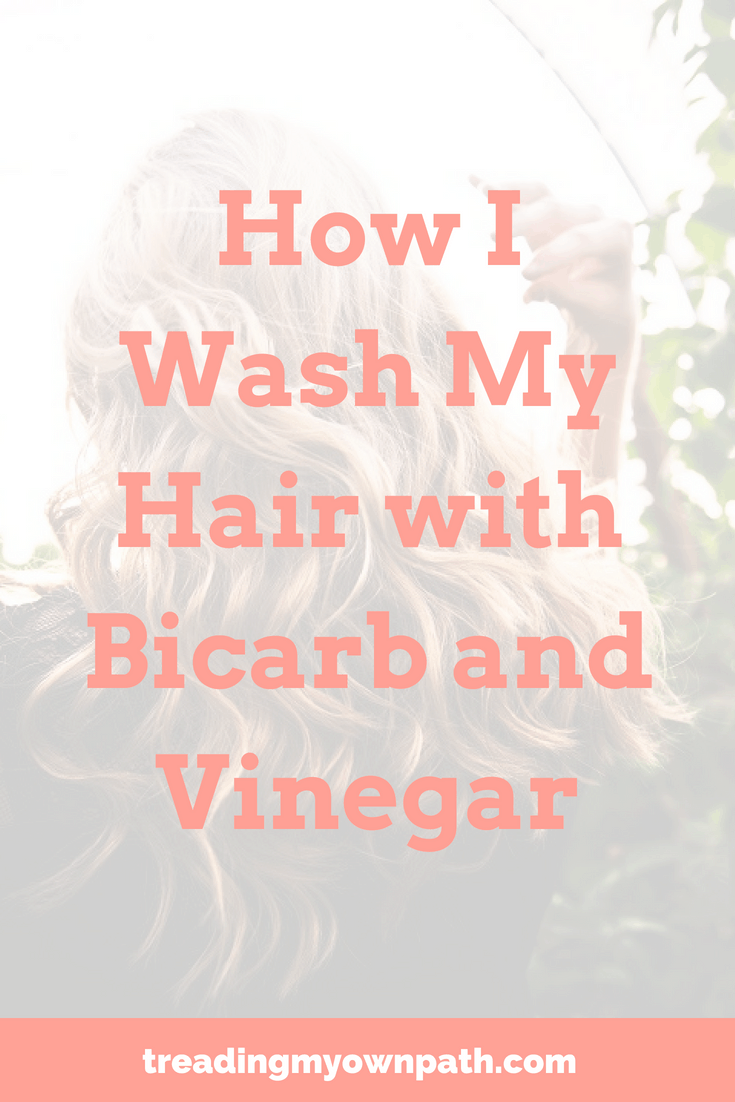

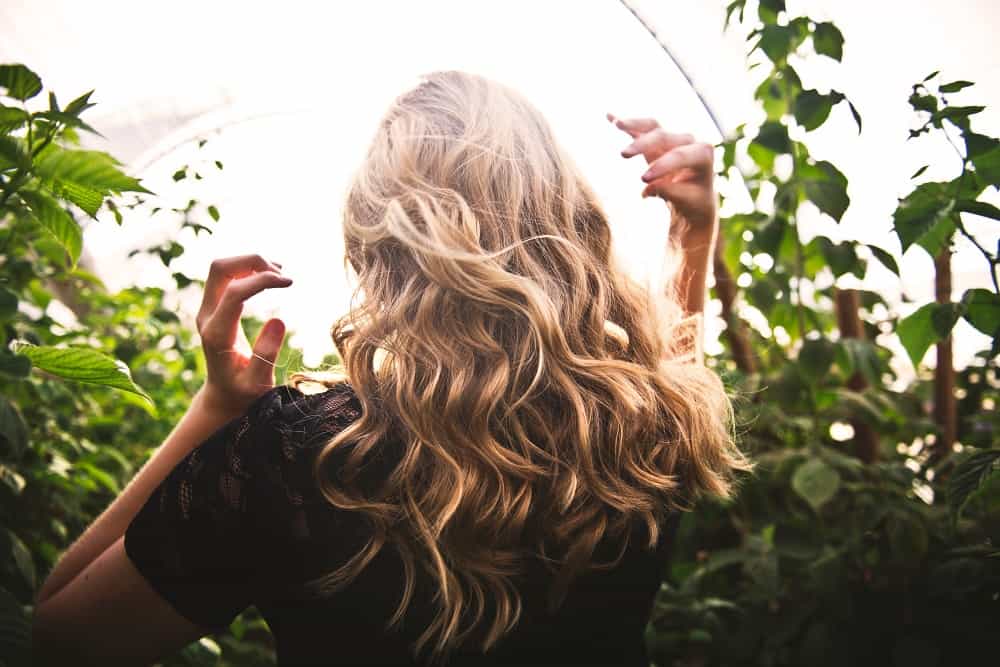




I’ve been using the bicarb for years and now have my husband convinced too. We are older, so grease is not an issue aand we don’t bother with the vinegar.. Both of us have beautiful body to our hair and the bicarb highlights the silver…my hairdresser says i couldn’t PAY to have the highlights i have…:-)
That’s great Julia! So glad it’s working for you too. And very impressed you managed to convince your husband!
Thanks for the great blog posts. I’m glad this hair washing method is working so well for you. I tried this for a few years and was initially happy with it but found that eventually it really dried my scalp out (I have a tendency to have a dry scalp anyway) and it was bleaching my hair blonde! That freaked me out.
I tried the full ‘no poo’ or just vinegar for about 4 months but because my hair is fine and largely straight I could never move past the oily stage. I also tried the rye flour method and it was okay, but as you say it’s quite messy and my scalp was still flakey.
At the moment I use a small amount of a high quality shampoo that looks after my sensitive scalp about twice a week. Not ideal but it seems to work best for my hair/scalp combination. I have discovered I can fill my own bottles with Ecostore shampoo at my local organic shop (along with other cleaning products) – so pleased!
Woah, sounds like you’ve been through a bit of a trial, Mel! There are so many factors to think about – hair type, skin type, even climate.
I have to say, the path to this wasn’t that straightforward for me, either. Amongst my various missteps, I bought a shampoo from a health food store that smelled so disgusting I started to convince myself the labels had been swapped and it was actually toilet cleaner. But of course – I couldn’t throw it away. So I’d slather on half a cup at a time and rinse off before it barely touched, just in case!
Glad you’ve been able to find refillables, that’s great! (I’m assuming they are not fluoro green like mine was ;)
Another alternative hair washing option is an egg – I used to use the egg white (beaten) to wash, and then the yolk as a conditioner. It worked pretty well… I only stopped because it was more hassle to do it this way. (Now I am thinking of going back to this….)
Hi Mara! I know Dora (who reads this blog) also uses egg to wash her hair, but I think she uses the whole lot at once. Maybe she will appear and confirm it ;p C’mon Dora, we need your thoughts!
Maybe if you used it all at once it would be less hassle?!
I use homemade kombucha as vinegar, once it’s gone too far. Does the same thing and I don’t have to pay more than a few cents per 2L! Plus I haven’t found anywhere cheap to refill my vinegar bottles.
That’s great, Katrina! I make my own apple cider vinegar, but I do prefer white vinegar for my hair. Oooh, the luxury of white vinegar that costs $2.50/litre ;)
Haha, how people change! I know there was a time when my former self would have died of embarrassment at the thought!
I did the bicarb/vinegar thing for a while – I can’t remember why I stopped now… I should start it up again! The one thing I found that made it the easiest thing in the world was putting my vinegar solution in a spray bottle to keep in the shower, thereby avoiding the whole pouring vinegar over only half of my scalp thing. It made for better coverage and less waste. I can appreciate that if you don’t already have a decent spray bottle (mine is fantastic quality and unlikely to die any time soon – from one of those random party-and-a-bit-of-everything-else shops) and want to avoid plastic altogether. I did also purchase this one before my plastic-free endeavours so I’m not sure what a plastic-free option could be there…
Thanks for sharing, Natasha! So can I ask, do you not rinse the vinegar after spraying? Or you do? I don’t like the thought of cold water on my head ;) Although I assume a spray is rather different to a cup of cold water!
I’m sure I’ve seen plastic-free spray bottles on the interwebs…
But getting a non-plastic spray bottle when you have a perfectly functional already is somewhat counterproductive!
I love bicarb/vinegar for washing my hair! I have really long hair and before I started I used to wash it every night with shampoo and conditioner because after handling it, the front would be super greasy. Now I only have to wash it 2 times a week. I find the whole length of my hair is less dried out than before – I don’t get that ‘fluffy’ hair after washing. Plus it’s way more cost effective than shampoos/conditioners!
Thanks for sharing – I haven’t heard from too many people with long hair who choose this, so good to know :) Glad it’s working for you!
My husband & I don’t use anything but water on our hair now! We started this in our 50’s when we were away camping! My husband rinses his hair every shower but I only rinse mine once a week or when I’ve been physically active or doing dirty jobs! I have found sometimes my scalp gets itchy so I then just use a little bit of a ‘healthier/cruelty free body wash but I might give the vinegar a go.
That’s great Alison! I’d like to get to that point. I find if I wash my hair with water only, that day it looks good, but the next day it reverts back to how it was before it was washed. But I will give it a go again sometime :) I actually find vinegar can help settle my scalp if it’s itchy. Let me know how you get on!
I started doing this in May and I persevered through four weeks of really funky hair because I wanted to see if it was really true and would work. And it does! My hair feels soft and less frizzy than before (have curly hair). I LOVE that we contribute no more plastic from the hair industry!!! And that we are not putting artificial stuff into our bodies through scalp.
Hurrah! When I started reading this I was expecting to read that you gave up – but you didn’t! That’s great Kim :) I think it feels kind of liberating, not having to buy products! Yes, you’ve summed it up perfectly. Thanks for sharing!
Yes, well put. It is truely liberating not having to buy products.
I have female alopecia (hereditary balding or thinning in women). Has anyone else with this condition used this with any success?
Hi Allison! I can’t help you out with this one but hopefully someone else can. Can I ask (and please excuse my ignorance) – are there things that make it worse? I don’t know much about the condition…
thanks Lindsay. some have said that stress makes it worse. another said it is also related to autoimmune types of conditions and that taking a zinc supplement would help.
Hi again Allison! Because bicarb is alkaline, it can weaken the hair, apparently. I’ve not experienced this, but a few other readers have mentioned it. (Some commercial shampoos are also alkaline, so the same thing would happen.) Rye flour has a more acidic pH closer to the skin’s natural pH so might be a good alternative? :)
I use cider vinegar as an everyday rinse. I am going to try the rye flour as a shampoo. I usually use a low impact body wash 2x a week, but like the idea of the rye. As you say sodium hydrogen carbonate (yet another name for it – the chemical name!) dissolves so easily you don’t know how much is left on your hands to apply.
Oooh, do let me know how you get on! Yes, I like that it remains a paste that you can rub into your hair properly :)
Hi Lindsay. Love this, thanks. I haven’t got into bi-carb and vinegar for my hair (yet). My approach to ‘product’, as with everything else is ‘using as little as it takes to get the job done well’ – so I go through about one 400ml bottle of each of shampoo and conditioner in 6-8 months, and at the moment I’m using bottles that are hand-me-ons from my daughter that have various amounts left in them. It’s great ‘how little’ it takes using just enough to offset the oil – it’s sort of a game to balance this so there’s no suds going down the drain. Cheers
Thanks, Anne. I know what you mean about using what you actually need versus what the label / marketing tells us we need! I used to use bucketloads of conditioner – I don’t think more actually is more – apart from more packaging and more products sold by the company! Have you ever noticed that shampoo bottles always tell you to shampoo twice? Crazy!
Let me know if/when you get there – I’d love to hear how i goes! :)
Read this today, tried this tonight. My hair has never been so soft and shinny. No tangles, oil free, no vinegar smell. Thank you
HURRAH!!! Did you use bicarb or rye flour? Ohhh I’m so excited for you Billi! :) (Love a new convert ;p )
I’m a daily shampoo’er (with a Lush bar). I just can’t push through the oily transition – I feel oily hair makes for oily face, makes for break outs. I need a solitary retreat perhaps to allow me to push through and adjust!?
If you’re happy with the Lush bars, why change? You can spend that extra time practicing your cooking ;)
Hi Lindsay. Thank you for this post! I was wondering how you purchase white vinegar without plastic? I live in America, and I’ve never seen white vinegar sold in anything but plastic (there is always an option to buy ACV in glass though!). While I don’t use white vinegar on my hair (I use a locally made shampoo bar), I do really like to clean with it. But since I can’t buy it in glass or in bulk, I’ve switched over exclusively to ACV, which is just a little too strong for me sometimes while cleaning. So — how do you buy white vinegar? Thanks!!
Hi Laura! It’s possible to buy vinegar from the supermarket in glass bottles with plastic screw top lids here, but there are also a few places that sell it in bulk. I refill a wine bottle every few months. If I couldn’t, I’d probably use ACV as I make my own. Have you tried making it? White vinegar is fairly cheap but ACV can be quite pricey and it can be made for almost free! Here’s the recipe if you’re keen to try: https://treadingmyownpath.com/2017/02/16/how-to-make-scrappy-apple-cider-vinegar-from-scratch/
Hi Lindsay,
I’ve been using bicarb and apple cider vinegar for a couple of years now. Short grey, fine hair. Works fine, no dandruff, and I love the soft, clean feel of it. I’ve convinced my husband as well and am now getting the courage to tell others at work about it too.
I love telling people I wash my hair with flour/bicarb and vinegar! Because it sounds like I should have dreadlocks, but of course my hair is completely normal looking – so it is immediately intriguing! I’ve converted a fair few people in my time ;) Good luck with your work peeps. I bet some of them give it a go! Let me know what happens!
yes id like to know how to get white vinegar plastic free also. Im facebook messaging my 2 local bulk stores now to see if they can get it in glass and how much $$ as i go through a fair bit in cleaning. If not ill have to find an online store that sells it in glass.
Hi Nikky, whereabouts are you based? I’m sure you’ve told me before but I can’t quite remember :/ I get white vinegar from Manna in South Fremantle :) It’s $2.50/litre.
Hello Lindsay, I have also been using the bicarb and vinegar for about 4 months now since I first came across your blog. No residual smell, no oily transition, it worked straight away, and amazing how soft my hair is, Bonus for me was I now have a less itchy scalp. My hairdresser is more than happy with my routine, a little annoyed that I no longer purchase commercial product but my hair is healthy and I am happy to have reduced waste in one more area of my life. It is all a work in progress
I use 2 heaped tspns bicarb in about half cup water and pour over and gently massage, and then 1/4 cup white vinegar fill up cup with water and pour gradually over head and massage in, rinse.
I keep the vinegar in the shower in an old sauce bottle, I keep the bicarb in an old jam jar on the bench and before I get into the shower, I put the bicarb in an old plastic cup and place in the shower area, and then add the water when I am ready to “shampoo’ my hair.
Thanks so much for sharing, so glad it is working for you :) Doesn’t it feel good to go to the hairdresser and not feel that you need to buy all their plasticky products? I still let my hairdresser use their shampoo when I go – which is about twice a year. But it takes a few washes to get all those chemicals and residue back out. Because it’s curly it has to be cut wet, so I don’t really have the option.
So goo to hear from another convert :)
There are curly hairdressers who will cut your hair dry.
Ok. Tempted to give it a go.
Hurrah! Let me know how you get on, Belinda!
Hi Lindsay. I wash my hair – long, straight, fine & now silver grey – with an egg. While egg straight in the head & massaged through then rinsed off. I sometimes add lemon juice for shine or Rosemary oil which promotes thicker hair. And I always rinse with rain water ! If I’ve been in the bush or yard & am really grotty I’ll just use my soap-free body wash first. Because I have naturally dry skin & hair I give my whole body & hair a good coconut oil bath every month or so – on a day where I don’t have to go out ! I’ve been doing this for about 30 years.
PS – Used the same routine for my kids, and the Rosemary oil will keep headlice away too !
I started using bicarb and vinegar about 5 years ago and have never looked back. I now find that I don’t the bicarb anymore. Most times I just use water and my hair comes out clean and shiny. If it looks greasy I will use the bicarb but this is getting rarer and rarer as my hair has now found its own balance.
I read your post last night… and as my children love the volcano bicarb/vinegar explosions, i quickly grabbed their science kit and slithered off into the bathroom.
At first i was not convinced… the product on my wet hair felt really think and my hands didnt “slide” through the hair like it does normally. But once it was dried it felt amazing! Cleanest its felt in a long time!!
The product stung my dried cracked hands but thats ok.. i can live with that.
But…. ive just found loads of other posts saying its not bicarb its baking soda?? Now im worried ive read it wrong and im doing it all wrong (visions of the classic volcano explosions on my head) . Do u definetly use bicarb soda?
I started doing this a couple of months ago because I didn’t want to spend so much in Lush’s shampoo bars anymore . I use the rye flour and vinegar. My hair is long, I wash it twice a week. The benefits have been: no greasy hair, no frizzyness, or puffiness, no more dandruff and my hair stopped falling- it used to fall a LOT in the shower as I would rinse the conditioner off, it was kind of alarming. My hair looks the same if not better than when I used regular shampoo products. I really don’t think anyone would be able to tell the difference from just looking at me. I’m happy I gave it a try.
Question: I presume you apply the bicarb slurry to wet hair? It’s not specified in your article.
Hey guys! Can you use any flour as a bicarbonate alternative?? My children have celiac disease and I would worry about the rye being absorbed by the skin and making them sick. Do you think a gluten free flour would work as well? Do you have any recommendations?
Do you use product for your curls? If I don’t, I’m a frizz-ball! Any recommendations for combining curl product (or making your own) with the bicarb/vinegar wash method?
Linseed gel works really well for curly hair :)
Just starting my journey into a plastic free life and so pleased to have found you! Washed my hair for the first time in rye and vinegar and it looks great so far
Really looking forward to what else I can find!
I have an allergy to most shampoos and saw a thing on Pinterest about how to regrow hair that has been thinned it was vinegar and bicarb I like it a lot and I rinse with vinegar too since it is a softener
Great blog, i used hair serum for hair growth in natural infusions with natural ingredients and i got a good hair growth